
School
Courses

The following presence courses are currently pausing. They will continue as soon as possible. For application, please send an email to: courses@IGS.LogDynamics.de
Voice Development
The course series began on July 17, 2019 and will be held continuously.
Improving a Draft Research Paper – is the second part of the workshop series "Tools for the Craft of Research (PhD)". The course has started in November 2019.
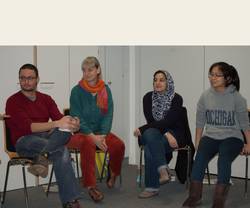
Continuous course:
Voice Development
Students get the opportunity to improve their English pronunciation. The programme starts with an introduction into how pronunciation works and which structures and functions are involved. A recording of every new participant reading a short text helps to develop an individual training programme and provides the opportunity for comparison with the outcome. Special exercises help to develop new competences which then can be transferred to own texts and spontaneous speech. For training, two students share a time slot once or twice a month.
Voice Development
Students get the opportunity to improve their English pronunciation. The programme starts with an introduction into how pronunciation works and which structures and functions are involved. A recording of every new participant reading a short text helps to develop an individual training programme and provides the opportunity for comparison with the outcome. Special exercises help to develop new competences which then can be transferred to own texts and spontaneous speech. For training, two students share a time slot once or twice a month.
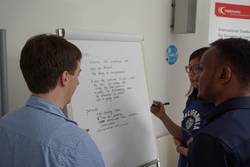
Workshop series:
Tools for the Craft of Research
This course is intended to assist young researchers in starting and carrying on with their individual research project. Firstly, the participants gain an overview of the scientific research process in general, develop a deeper understanding of their individual research project, and learn basic writing skills, enabling them to produce a detailed project plan. Secondly, it elaborates the fundamental rules for good scientific practice. It has the participants experience discipline-independent research methods in the specific context of their research projects. Finally, the issues will be reflected and compared with the German research culture. The lecturer is supporting the doctoral candidates individually according to their specific strengths and weaknesses.
Tools for the Craft of Research
This course is intended to assist young researchers in starting and carrying on with their individual research project. Firstly, the participants gain an overview of the scientific research process in general, develop a deeper understanding of their individual research project, and learn basic writing skills, enabling them to produce a detailed project plan. Secondly, it elaborates the fundamental rules for good scientific practice. It has the participants experience discipline-independent research methods in the specific context of their research projects. Finally, the issues will be reflected and compared with the German research culture. The lecturer is supporting the doctoral candidates individually according to their specific strengths and weaknesses.
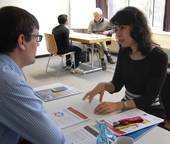
SpeedDating for Scientific Purpose
It is a challenge to get across the point of a PhD topic quickly. Project managers or salespeople often use the metaphor of the "elevator pitch" to explain that one has to be able to actually not only say what s/he is doing but do it in a way that is interesting. The IGS employs the metaphor of speed dating to make a lot of people know each other and their research topics in a very short time and to brigde the disciplinary and cultural gap as well.
Each participant has two tasks: 1. to introduce her/himself and her/his research topic with a few words to someone from a different discipline and with an unknown cultural background and 2. to listen and identify common research interests or a mutual basis for further cooperation.
It is a challenge to get across the point of a PhD topic quickly. Project managers or salespeople often use the metaphor of the "elevator pitch" to explain that one has to be able to actually not only say what s/he is doing but do it in a way that is interesting. The IGS employs the metaphor of speed dating to make a lot of people know each other and their research topics in a very short time and to brigde the disciplinary and cultural gap as well.
Each participant has two tasks: 1. to introduce her/himself and her/his research topic with a few words to someone from a different discipline and with an unknown cultural background and 2. to listen and identify common research interests or a mutual basis for further cooperation.

Seminar:
Interdisciplinary Research Colloquium (IRC)
The internal interdisciplinary research colloquium offers an institutional, research issue related forum where doctoral candidates and guest researchers present and discuss concept and status of their projects. Findings are exchanged and inter-cultural experiences are shared. There are discussion groups of all IGS‘s supervisors from the disciplines Production Engineering, Physics/Electrical Engineering, Mathematics/Computer Science, and Economics to ensure targeted impulses for the respective research project, and also regular discussion groups that leave the young researchers continuously with structural supervision among themselves.
Interdisciplinary Research Colloquium (IRC)
The internal interdisciplinary research colloquium offers an institutional, research issue related forum where doctoral candidates and guest researchers present and discuss concept and status of their projects. Findings are exchanged and inter-cultural experiences are shared. There are discussion groups of all IGS‘s supervisors from the disciplines Production Engineering, Physics/Electrical Engineering, Mathematics/Computer Science, and Economics to ensure targeted impulses for the respective research project, and also regular discussion groups that leave the young researchers continuously with structural supervision among themselves.

Workshop:
Logistics as Motivation for PhD Research
It is nearly impossible to find any product that can reach the customer without logistical support. In todays globalized world the competition is no longer between individual companies rather it is between rival supply chains. The objective of this workshop is to: (a) Learn about fundamental principles of Logistics and Supply Chain Management and (b) develop awareness of how modern scientific knowledge has made supply chains more efficient and responsive. Each participant will develop at least a single page research motivation summary that associates their work with logistics and with the research fields of LogDynamics.
Logistics as Motivation for PhD Research
It is nearly impossible to find any product that can reach the customer without logistical support. In todays globalized world the competition is no longer between individual companies rather it is between rival supply chains. The objective of this workshop is to: (a) Learn about fundamental principles of Logistics and Supply Chain Management and (b) develop awareness of how modern scientific knowledge has made supply chains more efficient and responsive. Each participant will develop at least a single page research motivation summary that associates their work with logistics and with the research fields of LogDynamics.
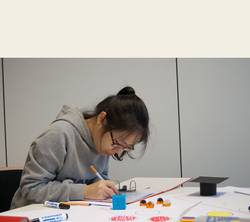
Lecture course:
Dynamics in Global Production and Logistic Systems
The complexity and dynamic changes over time lead to several challenges for the decision making in production and logistic systems, where additional issues have to be properly considered by decision makers. The application of new handling, information, communication, and positioning technologies, as well as the assignment of greater autonomy for the decision making of agents which act in production and logistic systems, create the basis for the development of more adaptable, consequently and more intelligent systems. Participants of this course were introduced into strategic decision making by a systems engineering viewpoint.
Dynamics in Global Production and Logistic Systems
The complexity and dynamic changes over time lead to several challenges for the decision making in production and logistic systems, where additional issues have to be properly considered by decision makers. The application of new handling, information, communication, and positioning technologies, as well as the assignment of greater autonomy for the decision making of agents which act in production and logistic systems, create the basis for the development of more adaptable, consequently and more intelligent systems. Participants of this course were introduced into strategic decision making by a systems engineering viewpoint.
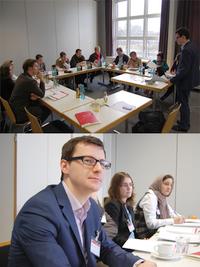
Doctoral Workshop at LDIC
The LDIC-Doctoral Workshop is a satellite event of the International Conference on Dynamics in Logistics (LDIC). Doctoral canditates from different disciplines focuses on a crucial aspect of Dynamics in Logistics. It offers an opportunity to present and to defend the own research topic, the first ideas for a research approach or the first findings. The purpose is to generate impact for the progress and the excellence of the thesis by discussing and reviewing the research proposals and to present the own research in an international context. Thus, a second integral aspect of the Doctoral Workshop is the training of professional presentation skills for science and academia.
The LDIC-Doctoral Workshop is a satellite event of the International Conference on Dynamics in Logistics (LDIC). Doctoral canditates from different disciplines focuses on a crucial aspect of Dynamics in Logistics. It offers an opportunity to present and to defend the own research topic, the first ideas for a research approach or the first findings. The purpose is to generate impact for the progress and the excellence of the thesis by discussing and reviewing the research proposals and to present the own research in an international context. Thus, a second integral aspect of the Doctoral Workshop is the training of professional presentation skills for science and academia.
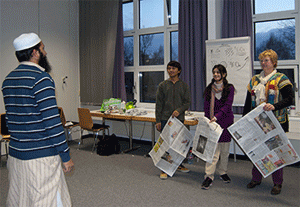
Workshop:
Leadership and Teamwork without Borders (in Logistics)
The workshop trains participants to take over the role of a team member or a leader while being oneself. The participants got the chance to experience the different roles and take over the different perspectives. The workshop pays attention to the common aspects and needs skills for fulfilling the different roles in various situations. The metaphor of conducting is used to change the familiar perspective. The workshop focuses on the specifics of being an international doctoral candidate or a guest researcher in an interdisciplinary research environment with the common topic Dynamics in Logistics.
Leadership and Teamwork without Borders (in Logistics)
The workshop trains participants to take over the role of a team member or a leader while being oneself. The participants got the chance to experience the different roles and take over the different perspectives. The workshop pays attention to the common aspects and needs skills for fulfilling the different roles in various situations. The metaphor of conducting is used to change the familiar perspective. The workshop focuses on the specifics of being an international doctoral candidate or a guest researcher in an interdisciplinary research environment with the common topic Dynamics in Logistics.
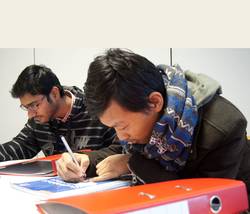
Continuous course:
Academic Writing
In this course scientists from different departments come together and work on their academic writing skills. The class focuses on vocabulary, style and structure of academic texts. The participants polish short pieces of individual writing in small groups and also take part in workshops such as „Basic Rules of Academic Writing“ or „How to Write an Abstract“. The course is tailored to the individual needs and questions of the doctoral candidates. All students can work on their specific research topics in the field of „Dynamics in Logistics“ and discuss their writing within an international and interdisciplinary group. Students meet on a two-weekly or monthly basis.
Academic Writing
In this course scientists from different departments come together and work on their academic writing skills. The class focuses on vocabulary, style and structure of academic texts. The participants polish short pieces of individual writing in small groups and also take part in workshops such as „Basic Rules of Academic Writing“ or „How to Write an Abstract“. The course is tailored to the individual needs and questions of the doctoral candidates. All students can work on their specific research topics in the field of „Dynamics in Logistics“ and discuss their writing within an international and interdisciplinary group. Students meet on a two-weekly or monthly basis.

Workshop:
Project Management for a Research Project
This basic workshop serves as enabler for a successful research or PhD enterprise. In particular, it focuses on the development of a clear research plan by using road-mapping, competence mapping and other project management tools to get a complete ‘picture' of the personal research journey of the near future. As a result, an individual research plan supports the PhD, Master or Bachelor research project of any participant in a professional and effective way.
Project Management for a Research Project
This basic workshop serves as enabler for a successful research or PhD enterprise. In particular, it focuses on the development of a clear research plan by using road-mapping, competence mapping and other project management tools to get a complete ‘picture' of the personal research journey of the near future. As a result, an individual research plan supports the PhD, Master or Bachelor research project of any participant in a professional and effective way.
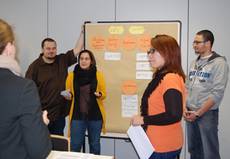
Workshop:
Methodological Consensus: Different Methods. Shared Standards.
This workshop provides a basic foundation of various methods for gathering and/or analysing data and shared standards for larger and more persistent features of the scientific enterprise. The participants received guidelines for how to develop an individual research design. The participants discuss methods versus methodology for fruitful exchange and a better understanding of trans-disciplinary research.
Methodological Consensus: Different Methods. Shared Standards.
This workshop provides a basic foundation of various methods for gathering and/or analysing data and shared standards for larger and more persistent features of the scientific enterprise. The participants received guidelines for how to develop an individual research design. The participants discuss methods versus methodology for fruitful exchange and a better understanding of trans-disciplinary research.
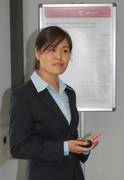
Continuous course:
Cross-cultural Coaching in English
The course is designed for researchers writing a PhD Thesis. The curriculum aims at improving the communication and language skills of persons who need to give scientific lectures, contribute to international research projects, take part in conferences, workshops and meetings where English is used as the language of communication. The course offers continuous support i.e. a class every two weeks in a small inter-disciplinary and multi-cultural group. The content of the course is drawn from topics relating to the research fields of the participants and which have a close connection with their ongoing work.
Cross-cultural Coaching in English
The course is designed for researchers writing a PhD Thesis. The curriculum aims at improving the communication and language skills of persons who need to give scientific lectures, contribute to international research projects, take part in conferences, workshops and meetings where English is used as the language of communication. The course offers continuous support i.e. a class every two weeks in a small inter-disciplinary and multi-cultural group. The content of the course is drawn from topics relating to the research fields of the participants and which have a close connection with their ongoing work.
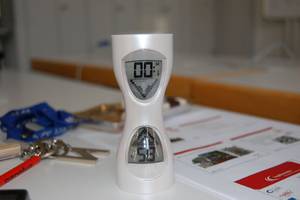
Workshop:
Time Management
Through the implementation of established time management methods, individual disturbances can be minimised, priorities can be set and planning horizons can be determined in order to make the own work more effective. During this workshop the participants learn to deal mainly with the following topics: Basics of time management, efficiency versus effectiveness, important or urgent, structuring your time, would ’ave, could ’ave, should ’ave and expect the unexpected.
Time Management
Through the implementation of established time management methods, individual disturbances can be minimised, priorities can be set and planning horizons can be determined in order to make the own work more effective. During this workshop the participants learn to deal mainly with the following topics: Basics of time management, efficiency versus effectiveness, important or urgent, structuring your time, would ’ave, could ’ave, should ’ave and expect the unexpected.
International Graduate School for Dynamics in Logistics (IGS)
Current courses:
none
For application or cancellation, please send an email to:
courses@IGS.LogDynamics.de
For the binding conditions of participation, please note the following document:
Terms and Conditions
Previous Courses:
Presenting Yourself - Online
Improving Research Paper
Voice Development
Research Idea to Paper
Presenting Yourself - Basic
Academic Writing
Supply Chain Network Design
Dynamics in Logistics - Basics for Multidisciplinary Approaches
(04-M10-L-PT50)
Craft of Research
Proposal Writing for a PhD
Presenting Yourself - Advanced
Selbstpräsentation - Aufbaukurs
Bibliometrics for Literature Reviews
Business Dynamics
Leadership
Wireless and Mobile Networks
Supply Chain Network Design
Management of Global Logistics
Logistical Motivation
IRC- SpeedDating
Research Methodologies
LDIC Doctoral Workshop
Dynamics in Global Production
Leadership and Teamwork
Methodological Consensus
Project Management
IRC



